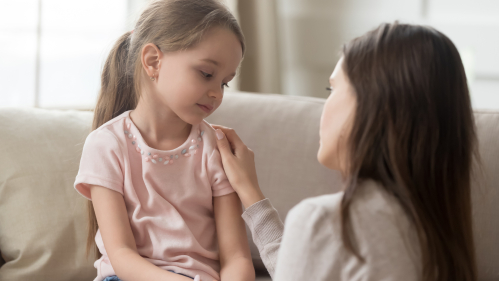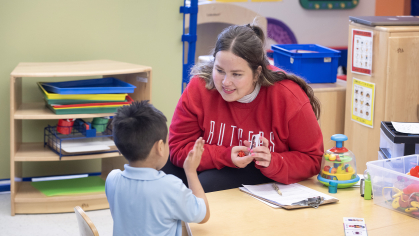Strategies to Help Children Cope With the New Reality Created by COVID-19

Rutgers experts share their advice for helping children navigate changes in a difficult time
A few days after the COVID-19 pandemic changed life as we know it – closing schools in 46 states and requiring nonessential workers to stay at home – Rutgers psychology professor Edward Selby sat cross-legged on the floor, forming a triangle with his two young children.
He guided 7-year-old Briella and Kieran, age 4, through a discussion of what an emotion is, and what emotions they were all feeling at the moment: sadness about missing school, worry about what the future would bring, happiness at spending time at home with mom and dad.
The two-minute break, what Selby calls a “mindful moment,” was such a hit that it’s become a daily – and highly anticipated – part of the family’s new routine.
“It’s a way of helping kids to deal with their emotions, learning to understand the difference between such things as anger, fear and anxiety,” says Selby, a professor in Rutgers’ Department of Psychology and director of clinical training for the department’s doctoral students at Rutgers-New Brunswick.
As the days of forced confinement grind on, Selby and other academics at Rutgers are drawing on years of research and experience to help families develop strategies to deal with a situation that is anything but normal – and which may not go back to normal any time soon.
Under orders from Gov. Phil Murphy, New Jersey residents are encouraged to stay home and avoid interactions in public to help stem the rise of COVID-19, the illness caused by the virus that has claimed the lives of over 22,000 people worldwide.
For families, priority number one is recognizing that things are different than they were before the coronavirus and communicating that reality to children who may be bewildered and frightened by the loss of control, says Patricia Findley, associate professor in the School of Social Work at Rutgers-New Brunswick and director of the master of social work program.
Children sometimes express those reactions in subtle ways, such as clinging to parents, wetting the bed, having nightmares, experiencing upset stomachs or becoming irritable, she notes.
“Talk to the kids about what’s going on,” Findley counsels friends who call her for advice these days. “Say things like, ‘You don’t seem like yourself’ if they’re showing regression or unwanted behavior – give them a chance to verbalize their emotions.”
No matter how hard you’re trying to protect the children, they’re going to overhear whispered conversations or catch an unwelcome broadcast on television, Findley says. A better approach is to find age-appropriate language to communicate your own anxieties to your youngsters, she urges, while offering strategies for coping with these new uncertain times.
“It’s okay to say that you have fears, too, and this is what YOU do to feel better: talk with friends, listen to music, read or listen to a book.”
Findley says when she feels overwhelmed, she takes three deep breaths in a row to calm herself down. She also makes a point of walking at least half an hour every day, getting away from the disheartening bombardment of news assaulting her from every television screen and computer monitor.
Selby and Findley stress the importance of establishing a routine for daily life, slotting in time for schoolwork, chores, playtime, exercise, snacks -- and copious coffee breaks for beleaguered fathers and mothers.
“You need some time alone,” Findley tells parents. “You have to take care of yourselves – you can’t take care of others if you don’t take care of you first.”
Selby points to an approach he pioneered, the Emotional Cascade Model, as a way to help individuals – children and adults -- learn to cope with unwanted thoughts and feelings.
Often, the clinical psychologist says, people under stress focus on negatives thoughts, working themselves into a frenzy and sparking such dangerous behaviors as self-injury, drug use, binge eating, reckless driving or aggression against others.
If you’re not paying attention to your emotions, you can easily get caught in this dynamic, he says. Disengaging the thought process through distracting yourself can stop the process from getting out of hand.
“I have done mindfulness work in clinical settings for years, so this was a good opportunity to teach the skill to my children at an early age,” he says.
When we are being mindful, he says, we let emotions and thoughts come into our minds. The goal is not to concentrate on the emotion, but rather on our breathing and our senses: touch, sound, smell.
To his surprise, the exercise, Selby says, might have been more helpful to him than to his children.
“It turned out to be a deep moment, and a connection to them that I haven’t experienced before,” the academic says. “I will certainly remember it when I’m older.”


